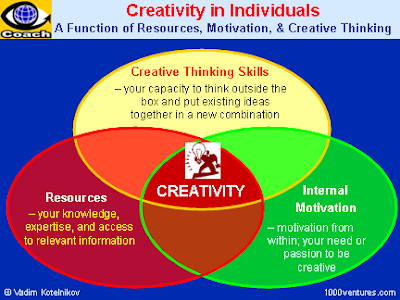"Creativity is allowing yourself to make mistakes. Art is knowing which ones to keep." – Scott Adams
Creativity Defined
A "new" idea is often a combination of old elements. Being able to devise new combinations depend on your ability to discern relationships between seemingly disparate items.
'Creativity is the juxtaposition of ideas which were previously thought to be unrelated.' It is your ability to combine ideas in a unique way or to make useful associations among ideas.
"There is virtually no problem you cannot solve, no goal you cannot achieve, no obstacle you cannot overcome if you know how to apply the creative powers of your mind, like a laser beam, to cut through every difficulty in your life and your work," says Brian Tracy.
Huge Personal Benefits
Creativity is your key to a brighter future. Creativity gives you an incredible source of adventure, achievement, self-discovery, connection, spirituality, awakening, normalcy, self-worth, identity, healing, happiness, energy and power.
Huge Business Benefits
All progress and innovation is the result of finding new – often radically new – better, cheaper, easier, or different ways to do things and solving customer's problems, and this requires the continual honing of your creative thinking arts and skills. The benefits of functioning more creatively can be enormous. You can win customers and retain them by producing more or of better quality or cheaper or faster or differently – and this requires doing things in new ways, differently, using creativity.
You Are Creative!
Creativity is not about inventing something totally new, it is about making new – synergistic! – connections. You don't have to be a special kind of person to be creative – everyone can do it. It's not about who you are, it's about what you do. You just need to start looking for multiple solutions rather than settling for just one, and give yourself permission to be playful and inquisitive, flexible and versatile.
Psychologists call the activities associated with idea generation "loose associative thinking" processes. Associative thinking is not linear or sequential. It is jumpy. To invent new connections, the maintenance of uncertainty is important for a time. "Closure is a killer; it strangles associative thinking, in favor of arriving at "an answer". Early in the process, leveraging uncertainty, riding it, and valuing it are critical to developing robust ideas.
An Important Pre-Condition
Although creative people come from varied backgrounds, they all seem to have one thing in common – they love what they are doing.
Practice Every Day
How often should you practice if you wish to win the World Tennis Cup: once a month? once a week? every day?
How often should you exercise your right brain's creative muscles if you wish to master your creative skills: once a month? once a week? every day?
Take a Different View
It was by taking a different view of a traditional business that major innovations were achieved. To find a better creative solution to the current practice, force yourself to reframe the problem, to break down its components and assemble them in a different way.
Ask Searching Questions
Creativity requires an inquisitive mind. Unless you ask lots of "Why?" and "What If"? questions, you won't generate creative insights. "To avoid this most common of creative errors, be sure to peek under all carpets, including your own.
Don't take anything for granted. Especially success. Try looking at the world through more inquisitive eyes; try getting ideas in motion; try asking the all-important: "Why?" See what happens!"
Mediation as a Source of Your Creative Power
Meditation has been scientifically proven to improve creativity, intelligence, memory, alertness, and to integrate left and right brain functioning. It has been shown to improve physical, mental, and emotional health. In a word, meditation is an invaluable tool to ensure that you are at your very best every day.
Innovation vs Creativity
• Creativity – coming up with ideas
• Innovation – bringing ideas to life
Creative Thinking Tips
• Break out of self-imposed limitations.
• Look for wider solutions, 'think outside the box'.
• Think sideways; explore the least likely directions; abandon step-by-step approach and thinking 'to one side' and master the 'lateral thinking' approach.
• Sharpen your brain – communicate and exchange ideas with other creative people as often as you can. This is useful not only for stimulating idea generation but also for giving you an opportunity to validate your ideas through professional colleagues.
• If you are thinking along a certain line and nothing happens, stop. Step out of your shoes, analyze the problem again and see if you can come up with a new approach.
• If you are working on a problem and getting nowhere, leave it for a while and let your subconscious – your depth mind – to take over. Soon, new ideas and facts will inspire new associations and innovative combinations.
Lateral Thinking – Looking for Wider Solutions
| Vertical Thinking | Lateral Thinking |
| • Chooses • Looks for what is right • One thing must follow directly from another • Concentrates on relevance • Moves in the most likely directions | • Changes • Looks for what is different • Makes deliberate jumps • Welcomes chance intrusions • Explores the least likely direction |
Think Creative and Act Creative.... Create your own space amongst the odd Prove Yourself!!! Because you are worth it :)


No comments:
Post a Comment